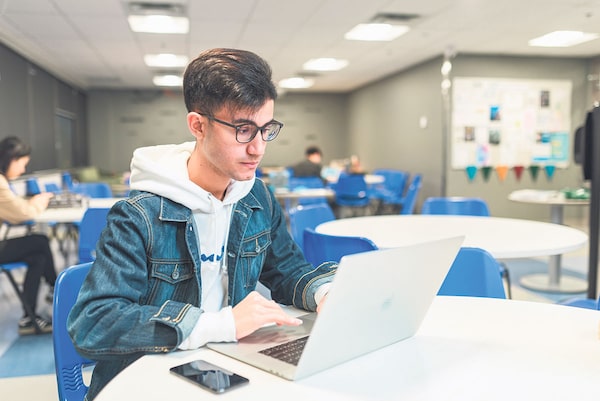
Columbia College’s laptop program helped students gain access to the equipment needed for virtual learning as part of the college’s extensive measures to support students through the coronavirus pandemic.SUPPLIED
Doing good and helping students through many of life’s challenges have been part of Columbia College’s DNA since it was founded in 1936 to help soldiers returning from war earn their high school diplomas. So when COVID-19 struck, the leaders at this Vancouver-based college – which is governed as an independent charity and society – did what they’ve always been driven to do: take care of their students.
“The college has always been able to rapidly respond to changing situations,” says Robin Hemmingsen, principal at Columbia College, which offers English language training, B.C. Ministry and accelerated secondary programs, a two-year university transfer program, as well as general and specialized associate degrees. “When it came time to respond to COVID, our first concern was not about deficits or the bottom line. What we were focused on was how we could best help our students.”
One of the first things Columbia College did was figure out what students needed to succeed as course delivery moved from in-class to online. An assessment of the student body – which includes mainly international students, many from rural areas in their country – revealed that a large majority did not own a personal computer and relied on the college’s computer labs for access to technology.
“When we realized that most of our students only had cell phones, we thought: there’s no way they can fully participate in online education through those small screens,” recalls Mark Friesen, executive director, charitable programs at Columbia College. “So the board quickly deployed $1-million to buy students laptops. A lot of students were incredulous, but we told them to just go get a laptop and send us the receipt.”
So far, says Mr. Friesen, 744 students have participated in the laptop access program, representing a disbursement of just under $500,000.
Consulting with faculty members, the college also learned that many newcomer students from different parts of the world lacked basic computing skills. Last month, the college started offering free digital literacy training to help students build typing skills and gain proficiency in Microsoft Office programs. The college is also set to launch a pilot program that will give students free access to industry-led microcredential courses such as Salesforce CRM and Google IT Professional Support.
Beyond the learning challenges presented by COVID-19, Columbia’s leadership team was also aware that many students found it even harder than usual to get work. Through its Community Connections program, the college arranged for job placements at local non-profit organizations – most of which are stretched financially while facing even greater demand from their communities – with the college covering the students’ wages.
“We’ve always realized the need for services and resources to support our students, and have continued to find ways to do things better year after year,” says Ms. Hemmingsen. “COVID has reinforced the importance of really understanding and addressing the challenges our students face, whether it’s loneliness or lack of financial resources. We’ve learned a lot in the past year – probably more than what we learned from the previous 10 years, and the results have been inspirational.”
Advertising feature produced by Randall Anthony Communications with Colleges and Institutes Canada. The Globe’s editorial department was not involved.